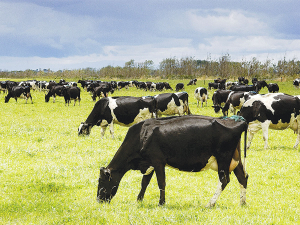Come and chat to the DairyNZ team
DairyNZ's team is looking forward to catching up with Southland and Otago dairy farmers at the Southern Field Days in Waimumu near Gore next month.
 A stoush over intellectual property and genomics could be on the horizon as both DairyNZ and LIC disagree on a key issue for the sector.
A stoush over intellectual property and genomics could be on the horizon as both DairyNZ and LIC disagree on a key issue for the sector.
OPINION: It's not common for industry-good body, DairyNZ and farmerowned co-operative LIC to publicly disagree on a key issue facing the dairy sector.
Housed next to each other at the sprawling Ruakura campus, both LIC and DairyNZ represent the interests of 11,000 dairy herds and their owners. This month, DairyNZ came out with its proposal for a single national animal evaluation breeding index that incorporates genomics.
DairyNZ – through subsidiary New Zealand Animal Evaluation Ltd (NZAEL) – believes that creating one animal evaluation index would ensure breeding decisions are made consistently.
This single evaluation will be co-ordinated by NZAEL – a wholly-owned subsidiary of DairyNZ – as an industry-good, credible source of data available to everyone to use.
In other words, this takes the hard-earned genomics database and genomics IP out of the hands of LIC and CRV, two of the sector’s leading genomics companies each with its own breeding worth animal evaluation index.
The sector is currently using three breeding worth animal evaluation indexes. DairyNZ chair Jim van der Poel says this creates confusion in the sector – and sub-optimal outcomes. So, they want things to change.
However, LIC is worried. In a letter to its shareholders, LIC chief executive David Chin didn’t mince his words.
He points out that LIC has already surpassed the DairyNZ proposal’s goal of 15BW and genomics has been a key contributor to this success.
“It is widely available to LIC’s 9000+ farmers and it is delivering significant value on-farm which will benefit your herds for years to come,” Chin told shareholders.
He claims there’s a lack of evidence that there will be value returned to the industry from the model, especially when New Zealand farmers, through LIC, have already made the investment into a state-of-the-art genomic model and made further investments into the collection of over 300,000 genotypes.
Peter Gatley, a former head of LIC’s genetics business, agrees.
Gatley says the attempt by NZAEL to requisition the IP belonging to two independent companies threatens to kill the golden goose.
“New Zealanders do not need reminding that removal of the incentive to get out of bed in the morning and add value results in a death spiral. There is no market failure in genetic improvement. NZAEL is now threatening just that.”
Over the next four weeks, both LIC and DairyNZ will be making their cases to shareholders and levy payers respectively.
It will be interesting to see if LIC and CRV give up their genomics IP to NZAEL without a fight.
Coming in at a year-end total at 3088 units, a rise of around 10% over the 2806 total for 2024, the signs are that the New Zealand farm machinery industry is turning the corner after a difficult couple of years.
New Zealand's animal health industry has a new tool addressing a long-standing sustainability issue.
The Government has announced that ACC will be a sponsor of this year's FMG Young Farmer of the Year competition.
As veterinary student numbers grow to help address New Zealand's national workforce shortge, Massey University's School of Veterinary Science is inviting more veterinary practices to partner in training the next generation of vets.
South Island dairy farmers will soon be able to supply organic milk to Fonterra.
Norwood has announced the opening of a new Tasman dealership at Richmond near Nelson next month.